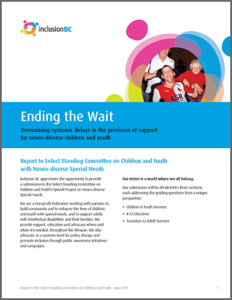Overcoming systemic delays in the provision of support for neuro-diverse children and youth
Report to Select Standing Committee on Children and Youth with Neuro-diverse Special Needs
Submitted to the Standing Committee on June 7, 2019
Inclusion BC appreciates the opportunity to provide a submission to the Select Standing Committee on Children and Youth’s Special Project on Children and Youth with Neuro-diverse Special Needs.
We are a non-profit federation working with partners to build community and to enhance the lives of children and youth with special needs, and to support adults with intellectual disabilities and their families. We provide support, education and advocacy where and when it’s needed, throughout the lifespan. We also advocate at a systems level for policy change and promote inclusion through public awareness initiatives and campaigns.
Our vision is a world where we all belong.
Our submission will be divided into three sections, each addressing the guiding questions from a unique perspective:
- Children & Youth Services
- K-12 Education
- Transition to Adult Services
How could Children & Youth Services be improved?
Recommendations:
- Eliminate wait times for assessments so that children and youth can access the supports and services they need.
- Increase funding for services for infants, children and youth to eliminate waitlists.
- Increase and improve public awareness and education of existing programs and services.
- Standardize assessment tools for all professionals.
- Eliminate geographical barriers to assessments by regionalizing assessment centres.
How could K-12 Education be improved?
Recommendations:
- Ensure early identification and assessment. Cross-Ministerial (Education, Health & MCFD) collaboration is necessary to provide early identification, assessment and intervention services so that all students will receive the support they need once they enter Kindergarten or at the time they are identified.
- Eliminate wait-times for psycho-educational assessments throughout the K-12 system.
How could Transition to Adult Services be improved?
Recommendations
- Expand the mandate of STADD to allow Navigators to support a broader population of youth with neuro-diverse special needs.
- Ensure the GSA is used for the purpose of providing support with accurate information about the support requirements for youth with neuro-diverse special needs.
- Improve collaboration among CLBC, Ministry of Health and Regional and Provincial Health Authorities to improve the way we support youth with neuro-diverse special needs.
- Eliminate geographic barriers to mental health assessments and support for youth with neuro-diverse special needs by regionalizing assessments centres.

